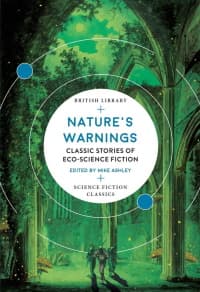
Nature’s Warnings: Classic Stories of Eco-Science Fiction edited by Mike Ashley
(British Library, 2020)
Reviewed by Graham Andrews
“Today we understand that the future of humanity very much depends on our planet, and that the future of our planet very much depends on humanity.” Mike Ashley chose that apposite quote from the Dalai Lama (My Tibet, 1990) to head the Introduction (‘Total Dependency’) to his eco-themed British Library retro-tome. Eleven stories, eleven warnings, with one minatory message: There is no cosily habitable planet for us in the Solar System, so—barring the development of cheap and cheerful FTL travel—we’ll either have to shape up or crap out, right here on Earth.
“The ecological movement is stronger now that is has ever been,” writes Ashley, “and the harm that is happening to the planet, primarily because of human intervention, is at last being fully understood. It has even been suggested that we have moved into a new geological epoch, the Anthropocene… Just when this began is still the subject of discussion, but dates range from twelve thousand years ago, with the start of agriculture, to as recent as 1945 and the dawn of the Atomic Age.”
The oldest story in the book is ‘The Dust of Death’ (1903), by Fred M. White (1859-1935). “They called me a crank because I asked for high electric voltage to kill the plague… Inoculation against the trouble is all very well, but it is not permanent and there is always danger whilst the source of it remains.” Gulp! The most recent story is ‘Hunter, Come Home’ (1963), by Richard McKenna (1913-1964). Human colonists attempt to terraform an alien planet using a deadly poison—but the planet fights back. Three of the remaining stories are by “Big Name” writers, and perhaps a bit over-familiar: ‘Survey Team’ (1954), by Philip K. Dick; ‘Drop Dead’ (1956), by Clifford D. Simak); ‘Adam and No Eve’ (1941), by Alfred Bester. The Bester story ends the book on a note of existential hope: “Within his body, within the rottng tissues that were rocking gently in the sea was the source of ten million-million lives.” Three others are by middle-ranking writers: ‘The Sterile Planet’ (1937), by Nathan Schachner; ‘The Gardener’ (1949), by Margaret St. Clair; ‘A Matter of Protocol’ (1962), by Jack Sharkey. In St. Clair’s neat little eco-shocker, Tiglath Hobbs, acting chief of the Bureau of Extra-Systemic Plant Conservation, cuts down a sacred Butandra tree on Cassid. Big mistake…
On a personal level, I particularly enjoyed the following three stories. ‘The Man Who Hated Flies’ (1929), by John D. Beresford (1873-1947) warns how the total extermination through manmade disease of an undesirable insect species (flies or mosquitoes) can also wipe out bees—leading to the failure of fruit and vegetable crops. Elizabeth Sanxay Holding (1889-1955) wryly writes, in ‘Shadow of Wings’ (1954): “We all believe there are experts around, to fix up anything and everything. Soil erosion, rivers deflected, droughts, forests destroyed, natural resources wasted away. Never mind. Scientists will make food, control soil, or water. Plagues? Let ‘em come; polio, flu, anything. Scientists will cope with them.” The last part rings true, though, especially in these pandemic times. But the stand-out story, for me, is ‘The Man Who Awoke’ (1933), the first part of an eventual fix-up novel (Ballantine, 1975) by Laurence Manning (1899-1972), Norman Winters is a suspended-animation sleeper who awakes at different dates in an increasingly fraught human future. As Isaac Asimov pointed out: “In the 1970s, everyone is aware of, and achingly involved in, the energy crisis. Manning was aware of it forty years ago, and because he was, I was, and so, I’m sure, were many thoughtful young science fiction readers.” A wintry tale, indeed.
Nature’s Warnings is another invaluable volume in Mike Ashley’s ongoing part-work encyclopaedia of science-fiction themes for British Library Classics, including Lost Mars, Menace of the Machine, and The End of the World and Other Catastrophes—which is something of a companion piece to this one, don’t you think?
Review from BSFA Review 14 - Download your copy here.
